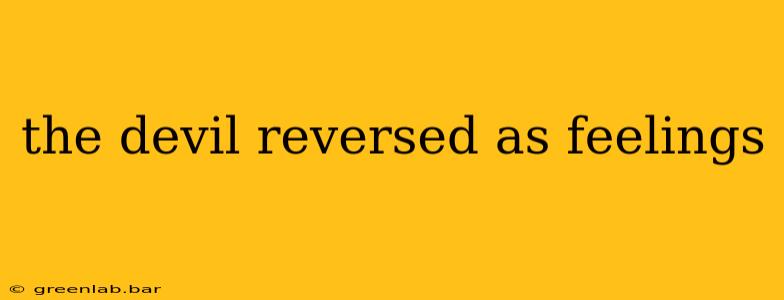The Devil reversed in a tarot reading often evokes a sense of unease. While the upright Devil signifies oppression, addiction, and limitation, its reversal suggests a turning point, a struggle for liberation, and a breaking free from self-imposed or external constraints. But what does this mean in terms of feelings? The emotional landscape associated with the reversed Devil is complex and nuanced, far from a simple "good" versus "bad" dichotomy.
The Weight of Chains Lifted: Initial Feelings of Relief
The initial feeling experienced upon seeing the Devil reversed is often one of relief. The oppressive weight of whatever situation or pattern the card represents begins to lighten. This could manifest as a sense of newfound freedom, a lessening of anxiety, or a gradual shedding of guilt or shame. You might feel a sense of hope blossoming where despair once reigned.
Breaking Free from Self-Destructive Patterns
This relief is closely tied to the breaking of self-destructive cycles. If the upright Devil indicated addiction, the reversed card suggests a conscious effort towards recovery, a willingness to confront and overcome harmful habits. This could be anything from overcoming substance abuse to finally disentangling oneself from a toxic relationship. The feelings associated with this liberation can be potent – a mix of exhilaration, fear, and determination.
The Struggle for Change: Navigating Ambivalence
However, the journey is not without its challenges. The reversed Devil doesn't instantly erase the negativity. The feelings associated with this stage are often marked by ambivalence. While the desire for change is present, the comfort of the familiar can be alluring. This internal conflict can manifest as:
1. Fear of the Unknown:
Leaving behind the known, even if it's painful, can be terrifying. Doubt and uncertainty can creep in, prompting feelings of anxiety and apprehension. You might question your ability to succeed in your newfound freedom.
2. Guilt and Self-Doubt:
Breaking free from long-held patterns can lead to feelings of guilt, especially if those patterns involved hurting others or neglecting responsibilities. Self-doubt might surface, making you question your worthiness of happiness and liberation.
3. Resistance from External Forces:
The reversed Devil doesn't negate external pressures. You might encounter resistance from others who benefit from your continued entrapment. This can lead to feelings of frustration, anger, and perhaps even a sense of betrayal.
Embracing Empowerment: The Path to Authentic Selfhood
As you navigate these complexities, a growing sense of empowerment emerges. This is the ultimate feeling associated with the reversed Devil. It's the understanding that you possess the strength and agency to shape your own destiny. This empowerment manifests as:
1. Increased Self-Awareness:
You gain a clearer understanding of your own strengths and weaknesses, enabling you to make more conscious choices.
2. Rising Self-Esteem:
As you overcome challenges, your self-belief strengthens. You begin to recognize your own resilience and capacity for growth.
3. A Deeper Connection to Your Authentic Self:
The reversed Devil signals a journey towards self-discovery and authenticity. You shed the masks and roles that no longer serve you, embracing your true self without fear of judgment.
Conclusion: A Journey of Transformation
The reversed Devil is not simply about the absence of negativity; it's about the active process of transformation. It's a journey marked by a complex interplay of relief, ambivalence, and ultimately, empowerment. Understanding the spectrum of feelings associated with this card is crucial in navigating the powerful changes it signifies. This journey towards authentic selfhood requires courage, resilience, and a willingness to embrace the unknown – but the rewards are immense.

